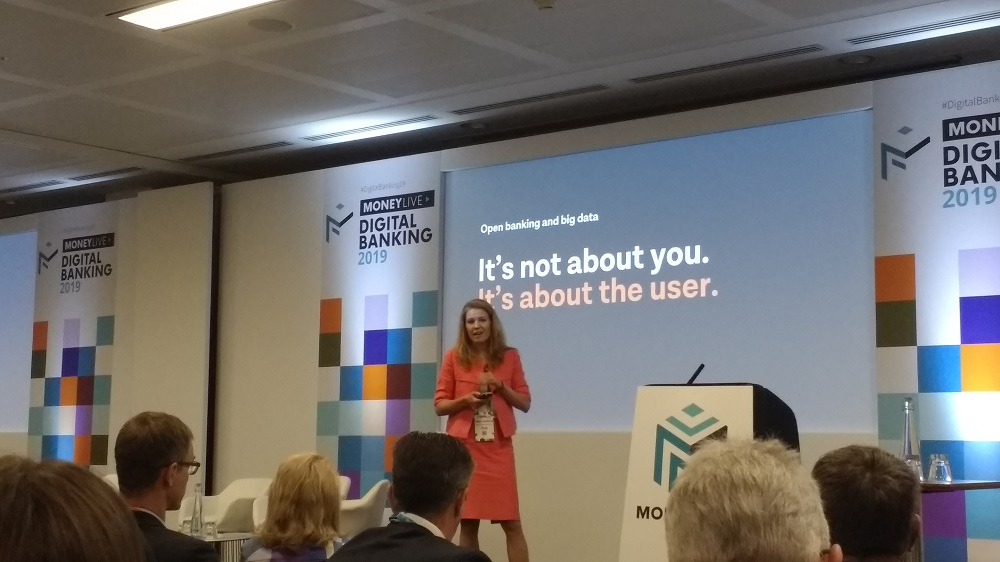
Traditional financial institutions must relentlessly focus on their customers in order to survive the “power shift” brought about by open banking, according to a digital finance specialist at fintech Tink.
Rewards for those companies that embrace disruptive technology trends in the industry and the personalisation of products and services will be both reputational and commercial success.
The message was delivered by Gwen Sandberg, business development director at Swedish financial technology firm Tink, during an address at the MoneyLIVE Digital Banking 2019 conference in London today (25 June).
She told her audience that open banking and PSD2 regulations in Europe have “rubber-stamped” disruption in the industry, and it is now the responsibility of financial institutions to make the most of “the opportunity of the century” by innovating and realising that power now lies in the hands of the consumer.
Data is key to surviving the open banking power shift, says Tink director
Ms Sandberg, whose firm develops digital tools to help firms adapt to the technology-driven banking environment, said the changes currently underway in the industry are a consequence of changing customer expectations and data proliferation.
She said: “Open banking is about a power shift – from the banks to the consumers – and it’s giving consumers control like never before.
“This is happening for two reasons. First, consumers now have the ability to control who has access to their data, and they are rewarding those that build fantastic products and services with that data.
“Second, this era of new technology is starting to affect every aspect of customers’ lives and they are starting to expect more.

“Companies are using this technology to build digitally-native, seamless services, and are raising the bar for what we’ve come to expect.”
Fintech companies have been busy developing innovative products and services for many years now, but Ms Sandberg believes the introduction of open banking and PSD2 regulations has heralded an “unprecedented scale of innovation and competition” by stripping incumbents of their competitive advantage by opening up access to customer financial data.
Banks should look to the likes of Netflix and Spotify for examples of good data use
When considering new approaches for implementing data-driven services, banks should take a look at other industries for examples of how to tailor new products to individual customers, according to Ms Sandberg.
Citing Netflix and Spotify as examples of firms whose data strategies banks should seek to emulate, she said: “To be able to innovate at scale you have to be able to learn to use big data, and smart data services.
“The media, technology and advertising industries do this extremely well.
“They no longer use demographics to segment their users. They use big data to follow what you are doing on their platforms, and to predict what you might want to do tomorrow.

“They deliver the exact experience that we want, and we don’t even have to ask for it. They know exactly how we’re going to use their products and what we want from them.
“When they make changes, they know how we will adapt and respond to that.
“But the banking industry has an advantage over these firms – because it has financial data, and that’s so much more than what music you like to listen to, or what TV show you like to watch.
“This financial data gives insights into customers’ entire lives – financial goals, hobbies, interests, where they are, what they spend money on.”
Time is running out for banks to adapt
If banks can learn to use data as effectively as these tech companies and develop “highly personalised experiences”, they will find themselves in a strong position and able to compete in the new environment.
But time is running out, warns Ms Sandberg.
“You’ve got to do it, and you’ve got to do it now because your competitors no longer have personal advisors or ATMs, they have machine learning algorithms that recommend products and services, and they are moving at the speed of light,” she said.
“Now that users can cherry pick the products and services that they want in the comparison shop then this is no longer about you, it’s about them,” she told her audience.
“There will be those that don’t adapt, or adapt too slowly, and there will be those that recognise that customers will manage their money in a radically different way in the future.
“They will be able to use big data to create personalised products and services and then there will be those that relentlessly focus on the user and build trust. Those are the ones that will be rewarded with a great reputation and ultimately commercial success.”






